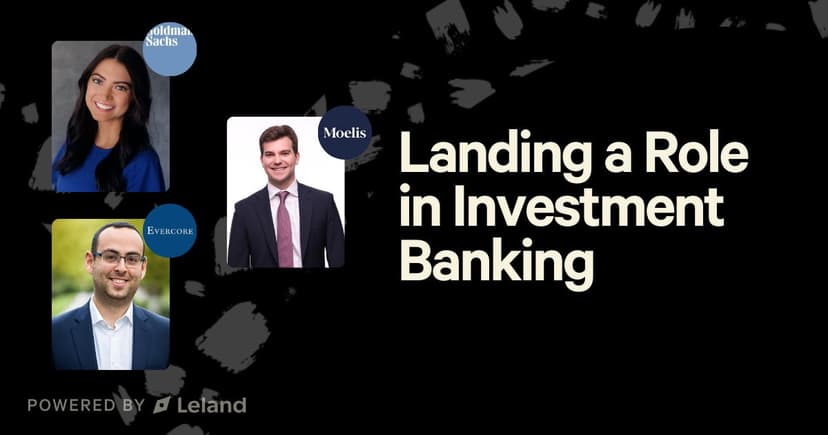Goldman Sachs Interview Guide: Process, Questions, & Tips (2025)
Goldman Sachs interview guide with 2025 tips, process breakdown, and sample questions to help you prepare, stand out, and succeed in investment banking.
Posted October 25, 2025

Join a free event
Learn from top coaches and industry experts in live, interactive sessions you can join for free.
Table of Contents
If your long-term goal is an analyst or summer analyst role in the Investment Banking Division (IBD), you already know the selection bar is high. The interview process and what you can expect will vary depending on the division within Goldman Sachs, as each division, such as front-office or internal divisions, may have its own specific requirements and interview formats. Summer analyst roles are designed for those early in their careers, such as students or recent graduates.
In front-office recruiting at financial institutions like Goldman Sachs, recruiters scan hundreds of profiles and make keep-or-cut decisions in minutes. Choosing the right topic is essential to stand out. College admissions officers work the same way when reading essays. In both cases, the decision makers are asking:
Can you explain complex ideas clearly?
In IBD interviews, you might be asked to explain how bond prices move with interest rates or to walk a client through financial reports. In an essay, that translates to taking a meaningful experience and breaking it down so the reader understands the stakes, your actions, and the result without getting lost in jargon or filler.
Can you walk through your decision-making process logically?
Bankers listen to how you evaluate tradeoffs in a live deal, a market call, or a group project. Admissions readers look for the same structure in your storytelling: why you chose a path, how you weighed alternatives, and what you learned.
Do you have the technical skills or learning ability to deliver?
Analysts prove their expertise in interviews by solving a financial modeling exercise or answering technical questions under time pressure. In essays, you show it by describing how you learned a new skill, applied it to a real project, and measured the outcome.
Do you fit the culture?
Front-office teams care whether you’ll work well under pressure, contribute to a team, and build trust with clients. Schools want to know the same. Will you add value in discussions, projects, and campus organizations? Your essay is where you can reflect traits that match both Goldman Sachs culture and your target school’s values.
The Application Parallels
Think of your essay as running through the same stages as the Goldman Sachs interview process, where completing each stage effectively is crucial to advancing:
| Essay Stage | IB Recruiting Parallel | What to Do |
|---|---|---|
| Opening lines | Online application screen | Hook the reader fast, make the first two sentences specific and high-impact, just like bullet points on a resume that get you pulled into the next step. |
| Middle paragraphs | HireVue interview / first-round | This is your live answer, clear, structured, and relevant. Like answering behavioral questions, you should explain the situation, your role, the actions you took, and the measurable results. |
| Closing paragraph | Final interview round / Superday | Leave the reader with a strong reason to advance you. In IB, that’s why they’d want you on the deal team. In admissions, it’s why they’d want you contributing to their incoming class. Completing each of these stages is essential for success. |
Expert tip for analysts and summer analysts: When drafting topics, pressure-test them the same way you’d test an answer in Goldman Sachs interviews. Give yourself 90 seconds to explain your story out loud. If you can keep it concise, cover context, and show impact without rambling, like you would in a timed HireVue interview, you have a strong foundation. If not, refine until it flows.
Read: Investment Banking Analyst: What They Really Earn in 2025 - Job Description, Salary, and Lifestyle
How to Use This Brainstorming Worksheet
Set Aside Focused Time
Treat this worksheet session like preparing for a Superday in the Goldman Sachs interview process, a single, uninterrupted block of 60–90 minutes. Work through it from start to finish without distractions so you can think clearly and make strong choices.
Write Down Your Key Experiences
Start with the most important moments from school, activities, or personal projects. Choose experiences where you led a group project, solved a challenging problem, worked with clients, or delivered a measurable result.
Identify the Skills in Each Story
Look at each experience and decide what it shows about you. It could be communication skills from leading a presentation, technical skills from building a financial modeling spreadsheet, or a strong decision-making process from handling a high-pressure situation.
Connect to Your Career Goals
Relate each story to your long-term goals in finance or business, and make sure to connect your experiences directly to the specific position you are targeting. If you’re aiming for an analyst or summer analyst position in the Investment Banking Division, show how the work you did reflects skills you would use in that position. For example, managing a club budget could be compared to tracking expenses on a client deal, while analyzing financial reports could parallel preparing a pitch for a firm.
Practice Your Delivery
Say each story out loud as if you’re answering a behavioral question in a video interview. Keep it concise and structured, cover the situation, what you did, and the result. This step will help you see which topics are clear and impactful, and which ones feel weak or unfocused.
Keep Only the Strongest Topics
If a story doesn’t show growth, measurable impact, or a clear focus, remove it from your list. Keep the topics that could hold up to follow-up questions in a final interview round with a senior interviewer.
Treat It Like a HireVue Interview
Prepare quickly, structure your response, and give a complete answer. If you can explain the story in under two minutes while keeping it relevant to your future in investment banking, it’s worth developing further.
For technical roles, candidates may also need to complete a HackerRank assessment as part of the process, which evaluates technical skills in addition to the interview.
Read: Investment Banking: What it Is & How it Works
Worksheet Section 1 – Personal Background & Interests
List Key Life Experiences
Your best college essay topics should come from experiences that show the same qualities front-office recruiters look for in an Investment Banking Division (IBD) candidate. These are moments where you had responsibility, made decisions, and delivered results. It's also important to demonstrate the qualities of a well-rounded person, such as handling feedback, building connections, and showcasing your personality traits, during the interview process. Think about times when you:
- Led a group project with real stakes and tight deadlines.
- Solved a challenge that required numbers, strategy, or both.
- Used financial news to guide a decision in a club or competition.
- Applied financial modeling or data analysis in schoolwork.
- Organized networking events or information sessions for peers.
These stories matter because they can be framed in a way that mirrors real analyst work, managing a workflow, making tradeoffs, and explaining your reasoning to others.
Example Table: Experience → Skill → Career Link
| Experience | Skill | Career Link |
|---|---|---|
| Managed school fundraiser budget | Financial tracking, decision-making process | Similar to managing expenses on a client project in investment banking |
| Led stock pitch competition | Financial reports analysis, presentation | Matches IB analyst pitch book research and presentation |
| Debated interest rate changes in the econ club | Market awareness, critical thinking | Same focus as explaining bond prices to a client |
Identify Core Interests
The interests you highlight should have a clear link to your future career goals. If you track financial news, share a specific example of how it changed a decision you made. If you follow bond prices and interest rates, connect that habit to classroom learning or a competition result. If you like building things, models, processes, and presentations, explain how those skills would help you contribute to a firm or division.
Expert Tip: The goal is to show that your personal interests naturally support the skills and mindset you’ll need as an analyst or summer analyst in the Goldman Sachs interview process and beyond.
Worksheet Section 2 – Academic and Career Goals
Connect Academic Strengths to Real-World Applications
In the Investment Banking Division (IBD), recruiters look for people who can turn classroom learning into practical results. Admissions officers value the same skill: being able to take theory and apply it to a concrete outcome.
Think about the classes where you’ve done more than just complete assignments. Economics projects might have prepared you to explain bond prices or market shifts. Math or statistics could have given you the tools to build a basic financial modeling sheet. Writing assignments might have developed your ability to summarize a firm’s quarterly financial reports in a clear, concise way.
When you describe these experiences in your essay, make the connection obvious. Show how the skills you developed in class would translate directly to the responsibilities of an analyst or summer analyst working with clients in finance.
For example: “In AP Statistics, I led the analysis of survey data for a school project. We used the results to reallocate resources, similar to how analysts prepare financial reports to guide client decisions.”
Show How You Prepare for Success
The way you prepare for your essay is not much different from how candidates prepare for entry-level positions in investment banking. Both require you to think ahead, organize your material, and be ready to perform under time pressure.
One way to do this is to practice giving short, structured answers, like you would for behavioral questions in a HireVue interview. Review your resume and make sure every bullet point can be expanded into a clear, engaging story. You can also run mock final round Q&A sessions with a mentor to test how well you handle follow-up questions, just as you would in a Goldman Sachs interview process.
By preparing in this way, you’ll be ready to write an essay that not only tells your story but also shows that you can focus, respond, and explain under the same kind of scrutiny you’d face in a high-stakes recruiting process.
Worksheet Section 3 – Strengths, Skills, and Achievements
Highlight Transferable Skills
In the Investment Banking Division (IBD), the most competitive analysts and summer analysts bring skills that transfer directly from school, clubs, or personal projects into a client-facing environment. When choosing your college essay topics, think about moments where you’ve shown the same capabilities recruiters look for in the Goldman Sachs interview process.
Communication skills might come from presenting to classmates, teachers, or even external clients during a competition. Technical skills could involve building a basic financial modeling spreadsheet, running quantitative analysis, or creating clear financial reports. Teamwork often shows up when you’ve managed roles and responsibilities in a group project, especially under pressure.
In your essay, these examples should be specific and measurable. Instead of saying you “helped with research,” describe how you coordinated three team members, consolidated data, and delivered a presentation that influenced a decision. This level of clarity matches the precision expected from an IBD analyst preparing a pitch book or deal memo.
Demonstrate Problem-Solving Ability
Problem-solving in IBD is about finding solutions quickly, often with incomplete information and under tight deadlines. In your essay, show situations where you worked through a challenge step by step and delivered a result.
Admissions officers, like investment banking recruiters, want to see that you can keep a clear head, make smart choices, and follow through, skills that are critical whether you’re in a final interview round or managing live work for a firm and its clients.
For example: You might describe fixing an error in a financial modeling sheet the night before a major competition, redesigning a process that was slowing down your team, or reworking a presentation to address new feedback. The key is to show how you analyzed the problem, made decisions, and executed under pressure.
Worksheet Section 4 – Overcoming Challenges
Frame Challenges as Learning Opportunities
High-pressure moments can define your readiness for an Investment Banking Division (IBD) role. In a final interview round for a Goldman Sachs interview, recruiters watch to see if candidates can stay composed, think clearly, and adjust quickly. Your essay should do the same: show how you managed pressure and turned a difficult moment into progress.
This could mean reorganizing your workflow to meet a tight timeline, mediating roles when a team faces conflict, or correcting a mistake in data and explaining the fix to stakeholders. In each case, the emphasis should be on the steps you took, how you kept focus, and what the outcome was. The way you approached these situations mirrors how analysts handle urgent requests or unexpected changes in client work.
Provide Valuable Insights
An effective essay doesn’t just recount what happened; it shows what you learned and how you’ve applied that learning since. Explain the change in your approach after the challenge. Did you become more disciplined with quality checks? Did you start breaking large projects into smaller, trackable parts? Did you learn to listen carefully to feedback before responding?
Make the connection to your future in finance clear. If you adjusted your process to prevent future errors, relate that to how you would manage the accuracy of a financial modeling spreadsheet or a pitch deck for a firm. If you improved your teamwork skills, link that to how you would contribute on a live deal team serving clients.
By showing both the immediate fix and the long-term growth, you’ll present yourself as someone who can handle pressure, adapt, and keep delivering, exactly what both admissions officers and IBD recruiters want to see.
Ideas That Worked – Analyst/Summer Analyst Examples
School Project as a Deal Team
Treating a school assignment like a live deal can make for a strong essay topic. In this example, the student coordinated research across multiple people, drafted the findings into a single document, and presented them to a panel of teachers acting as the “board.” The story highlights collaboration, structured delivery, and the ability to manage roles, skills that align directly with how an Investment Banking Division (IBD) analyst works with a deal team to prepare materials for clients.
Market Simulation Win
In a competitive market simulation, the student used financial news and interest rates data to lead a mock portfolio to top performance. This shows market awareness, analytical thinking, and the ability to apply information in real time, qualities that matter when answering Goldman Sachs interview questions or making recommendations to clients in a fast-moving environment.
Fundraiser as a Client Pitch
Organizing a fundraiser can be framed like pitching to clients. In this case, the student built a detailed budget, identified potential sponsors, and presented the plan persuasively to secure funding. It demonstrates communication skills, financial planning, and the confidence to present under pressure, similar to an analyst delivering a pitch book in IBD.
Econ Club Macro Call
As part of an economics club, the student explained bond prices and interest rate hikes to peers. This is similar to briefing a managing director or team member before a client meeting, taking complex market concepts and breaking them down into clear, actionable points.
Student-Run Networking Events
Organizing networking events with alumni in finance mirrors attending or planning a GS event. It requires coordination, outreach, and the ability to create value for participants. For an essay, this shows leadership, event management, and the initiative to connect people, traits valued both in admissions and the Goldman Sachs interview process.
Turn Worksheet Notes Into a Draft
Once you’ve filled out your worksheet, the next step is to turn your notes into a complete essay draft. The structure you use should make it easy for a reader, whether an admissions officer or an interviewer in the Goldman Sachs interview process, to follow your story and see your value.
Hook – Open With the Moment
Start with a sentence that drops the reader directly into the key moment. Choose a scene that shows action, decision-making, or pressure.
For example: “At 11 p.m., with our presentation due the next morning, I saw that our financial modeling spreadsheet had a major error.”
Context – Why It Mattered
Explain the stakes. In investment banking, that might be the risk of presenting the wrong numbers to a client. In an essay, it could be a high-impact school project or competition where results mattered.
Action – What You Did
Describe the specific steps you took. Be clear and concise, like answering a behavioral question in a HireVue interview. Show how you organized your team, made decisions under time pressure, or used your technical skills to solve the problem.
Result – Outcome With Numbers
Quantify the outcome whenever possible. Mention metric, how much time you saved, the percentage improvement, the amount of money generated or saved, or the ranking you achieved. In IBD, numbers and money prove impact; in an essay, they make your story credible.
Reflection – Valuable Insights That Tie to Your Career in Investment Banking
Close with what you learned and how it connects to your future goals. This could be improving your decision-making process, refining your quality control, or learning how to listen carefully to feedback. Tie it directly to how you would perform as an analyst or summer analyst in the Investment Banking Division.
Practical Parallels from the Goldman Sachs Interview Process
The Goldman Sachs interview process for analyst and summer analyst positions in the Investment Banking Division (IBD) shares a lot with how selective schools review essays. Both are short windows to make a strong impression, prove your fit, and show that you can deliver under pressure.
During the interview process, you may be evaluated by interviewers from different divisions or teams, each assessing your technical and situational knowledge. It's crucial to understand Goldman Sachs' operations, as interviewers often expect candidates to demonstrate awareness of the firm's organizational functions and how they relate to product management and the broader fintech landscape.
Online Application → First Impression of Your Essay
In IBD recruiting, your online application determines whether you make it to the next stage. It’s a quick scan for qualifications, clarity, and attention to detail. Admissions officers do the same with your essay. The first few sentences must hook the reader and make them want to keep going, just like the strongest bullet points on a resume get a recruiter to read more.
HireVue Interview → Your Main Story Delivery
A HireVue interview tests how clearly and confidently you can explain your experience in a set time. Your essay’s main body works the same way; it’s where you deliver your core story. It should be structured, concise, and focused on the actions you took, the results you achieved, and the skills you developed.
Final Interview Round/Superday → Multiple Readers Under Pressure
A final interview round or Superday often means meeting several bankers back-to-back, each evaluating your skills, decision-making, and cultural fit. In the same way, an essay may be read by multiple admissions officers, each looking for evidence of your reasoning ability, focus, and potential. Your story has to hold up no matter who is reading it.
Networking Events and Information Sessions → Researching Your Target School
Strong IBD candidates prepare for networking events and information sessions by knowing the firm’s work, recent deals, and team structure. Applying to a school works the same way; research its programs, professors, and opportunities so your essay shows genuine understanding and alignment.
The Bottom Line
If you want to excel in the Goldman Sachs interview process, whether for an analyst or summer analyst role, treat your preparation like training for a high-stakes competition. Master your technical skills, practice clear and concise communication, and refine your decision-making under time pressure. Just as with a strong college admissions essay, your goal is to make an immediate impact, prove your fit, and leave no doubt that you can deliver in the firm’s fast-paced, client-driven environment.
Start Your Goldman Sachs Analyst Journey with Expert Preparation
Landing an analyst or summer analyst role at Goldman Sachs takes more than technical skills; it demands resilience, precise communication, and the ability to perform under pressure. With the right preparation, you can stand out in the interview process, earn your spot, and set the stage for long-term success in investment banking. Work with an experienced coach to prepare with the same focus and structure that top candidates use to win offers.
Read these next:
- Investment Banking Resume Guide From a Former Banker (With Examples)
- Top 10 Interview Coaches
- Financial Analysis & Valuation for IB Interviews – A Beginner's Guide
- Investment Banking Interview Guide: What to Know
FAQs
Is Goldman Sachs’ interview difficult?
- Yes. The Goldman Sachs interview process for analyst and summer analyst roles is highly competitive, requiring strong technical skills, clear communication skills, and the ability to perform under pressure. Candidates often face multiple stages, including a HireVue interview, behavioral questions, and a final interview round or Superday with several bankers. You may also be asked to analyze or value companies, using financial statements and various valuation methods, as part of the technical assessment.
How many rounds of interviews does Goldman Sachs have?
- The number of rounds can vary depending on the role and division, but most Investment Banking Division (IBD) candidates complete three main stages: the HireVue interview, a Superday with multiple back-to-back interviews, and sometimes an additional team-specific interview before an offer.
How to pass the Goldman Sachs interview?
- Focus on both technical skills and behavioral questions. Practice explaining market concepts like bond prices and interest rates, be ready to walk through your decision-making process for a group project, and stay current on financial news to provide valuable insights during conversations.
What’s the average salary at Goldman Sachs?
- First-year analysts in the U.S. typically earn a base salary of around $110,000, plus bonuses that can raise total compensation significantly. Summer analysts are paid a prorated amount for the 10-week program, averaging $16,000–$20,000 depending on location and division.

























